The question – can goats eat turnips? is a pertinent one for many goat owners. Yes, they can. Turnips are not only safe for goats but are also a valuable source of nutrition that most goats enjoy. Incorporating these vegetables into your goat’s diet can offer significant health benefits.
As a goat owner, understanding and addressing your livestock’s dietary needs is vital. Turnips, although not a conventional choice, serve as a nutritious supplement to their usual feed. However, it’s crucial to take certain precautions when introducing turnips to their diet.
In the following sections of this article, we will dig into the details of feeding turnips to goats. We’ll examine their benefits, potential risks, and best preparation methods. Let’s begin this journey of dietary discovery for the well-being of our goats.
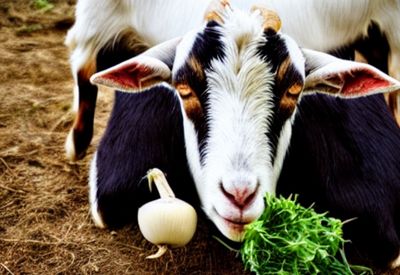
What are Turnips?
Turnip is a root vegetable that can be eaten by humans and animals. While they may look like a potato, they’re actually related to cabbage and radishes. In addition to their edible root, turnips also have leafy tops that can be eaten as well. These leaves are very nutritious and rich in Vitamin A, which is beneficial for many goats and other livestock.
What do Turnips Taste Like?
While turnips aren’t sweet by any means, most people describe them as savory or slightly peppery with a slightly nutty flavor. Some say the flavor of cooked turnips almost tastes like chestnuts. Since taste is subjective, not everyone will agree on what turnip tastes like. Your goats might enjoy the flavor more than you do.
[GoatAffiliate]
Can Goats Eat Turnips?
Yes. Goats are browsers, which means they eat things like grasses, leaves, weeds, and other plants. Turnips also fall into the category of edible plants for your goats to eat.
Are Turnips Safe for Goats?
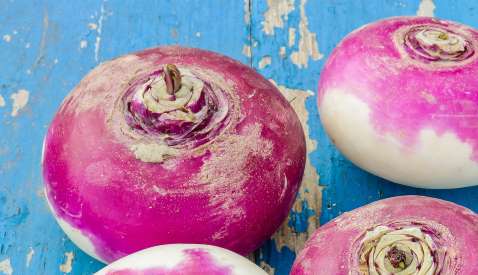
Yes. Turnips are very safe for goats to eat. Since they are so nutritious, turnips will also provide your goat with many benefits.
When giving turnips to your goats, the roots of the plant are usually consumed. The leaves can also be eaten if prepared correctly, but some people choose not to feed them to their goats at all due to the taste and health risks associated with eating mature leafy greens.
Remember that it’s always best to check with a local vet or goat farmer before feeding any new items or plants to your animals.
Health Benefits of Turnips for Goats
Turnips are very nutritious for your goats. Not only do they provide the essential nutrients that your goat needs to stay healthy, but they’re also low in calories and fat which makes them a healthy treat option.
Here are just some of the nutritional benefits of turnips:
- High in Vitamin A for good vision and strong bones.
- Low in Calories and Fat for reducing obesity issues in ruminants like sheep, goats, deer, etc.
- Rich source of Potassium which helps with muscle strength and natural water balance in animals’ bodies.
- Provides dietary fiber to keep digestion working properly.
Are there any Risks in Feeding Turnips to Goats?
Turnips are very safe for goats to eat. However, there are some risks you should be aware of when feeding turnips to your livestock.
Not all varieties of turnips are edible. The most common variety used as livestock feed is the white or golden turnip which has a purple top and yellow interior color.
These plants can cause poisoning in animals that eat large quantities due to the high levels of oxalates they contain. This could lead to kidney failure or other health problems in your goat if eaten regularly over time.
How to Prepare Turnips for Goats?
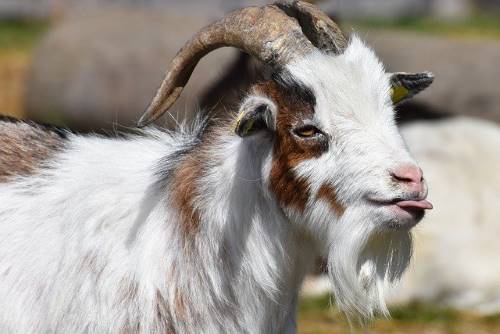
To prepare turnips for goats, make sure you know which type of turnip plant you have and follow the guidelines below:
Make sure your turnips are the edible kind with a golden or white exterior and purple leaves. The leaves can be eaten in small amounts (around one cup at a time) and shouldn’t cause any issues with poisoning. However, if they become wilted from being rained on, composted, etc., it’s best to remove them from your goat’s area.
When preparing turnips for goats, always wash them thoroughly before serving. You don’t want dirt or pesticide residue affecting their health later on.
Before feeding turnips to your goats, dice them up into small pieces so they’re easier to chew and digest.
Can Goats Eat Cooked Turnips?
Yes. Goats can eat cooked turnips just as easily as raw ones, but it’s usually easier to dice them up into smaller pieces when cooking.
If you’re dealing with a full-grown goat that weighs more than 200 pounds, then it might be best to feed turnips in small amounts around once or twice a week.
Can Goats Eat Raw Turnips?
Yes. Goats can eat raw turnips without any issues or negative side effects. Always remember to cut them up into small pieces so they’re easier to chew and digest.
Can Goats Eat Turnip Leaves?
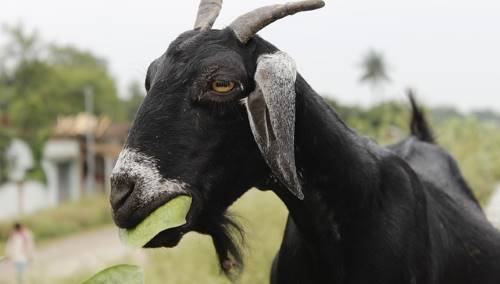
Yes. Goats can eat turnip leaves if they’re prepared correctly for them. Make sure to remove the mature leaves from your goat’s home before feeding them raw turnip greens.
The younger, more tender turnip leaves are fine to feed your goats as long as they don’t become wilted or damaged in any way.
Can Goats Eat Turnips Greens?
Yes, but only if you prepare them correctly first. The best thing to do is cut up the green parts of the turnip plant into smaller pieces before dicing them up and serving them to your animals.
This makes it easier for the goats’ digestive systems to process everything effectively so there aren’t any issues later on.
Make sure you know which type of turnip greens you have before feeding them to your goats. The most common type that’s edible for livestock is the white or golden turnip plant which contains smaller leaves with a light purple color on top.
Can Goats Eat Turnip Roots?
Yes. Turnip roots can be a great source of nutrients for goats, as long as the plants haven’t been overfed with chemicals or other harmful substances that could end up harming your goat’s health.
The turnip root is often used as a replacement for water in many cases, so make sure to weigh your options carefully before choosing to feed them to your goats on a regular basis.
Can Goats Eat Purple Top Turnips?
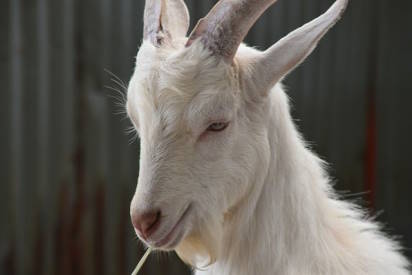
Yes. Although purple top turnips tend to have a strong flavor that many animals don’t enjoy, goats are usually an exception because they love different tastes and textures in their food options.
However, if your goat doesn’t seem to want to eat the purple top turnips, try cooking them first to make them easier for your goat to digest.
Can Goats Eat White Turnips?
Yes. Although white turnips may be harder for your goat to digest due to their tough skin and high levels of oxalates (which could cause poisoning if consumed regularly), they’re completely safe for goats to eat if fed correctly.
When serving white turnips for goats, always remember to remove the skin so your animals won’t have too much difficulty breaking it down.
How Often Should I Feed my Goats Turnips?
Around once or twice a week. Although turnips are safe for goats to eat regularly, make sure not to give them more than .5 pounds of the vegetable per day.
This will help your goat establish healthy eating habits while making sure that levels of sugar and starch in their diet remain stable every day.
What other vegetables can goats eat?
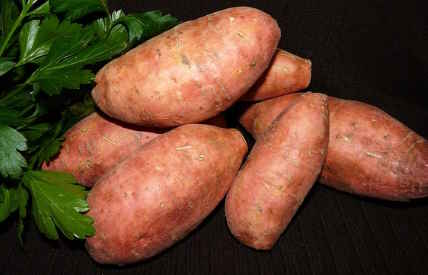
While many people know that turnips are a favorite, there is a wide variety of vegetables that can be part of a healthy diet for goats. Let’s explore what other vegetables goats can enjoy.
Carrots
Carrots make an excellent snack for goats. Not only are they crunchy and flavorful, making them appealing to goats, but they are also high in vitamin A and other essential nutrients. This vitamin is particularly important for goats, contributing to their vision health and overall vitality. However, it’s best to feed them in moderation and as a treat rather than a staple diet to prevent potential digestive issues.
Read More: Can Goats Eat Carrots? 5 Fantastic Benefits
Potatoes
While goats can eat potatoes, it’s crucial to serve them cooked, not raw. Raw potatoes contain solanine, a natural chemical that can be harmful to goats in large amounts. Once cooked, however, the solanine levels significantly decrease. It’s best to boil potatoes without adding any salt, butter, or oil. Remember to cool them down before offering them to your goats. Potatoes should only constitute a small portion of their diet due to their high starch content.
Read More: Can Goats Eat Potatoes? 5 Excellent Benefits
Sweet Potatoes
Similar to regular potatoes, sweet potatoes need to be cooked before feeding them to your goats. Sweet potatoes are high in fiber and contain several essential vitamins and minerals, making them a beneficial treat for goats. Once again, moderation is key, and these should not replace their main diet of hay, grasses, and specialized goat feed.
Read More: Can Goats Eat Sweet Potatoes? Simple Answer & Feeding Tips
Onions
Feeding onions to goats is generally not recommended. Onions contain a compound called N-propyl disulfide, which can cause hemolytic anemia in goats by damaging their red blood cells. Hemolytic anemia can lead to weakness, jaundice, and in severe cases, death. To ensure your goats’ health, it’s best to avoid onions altogether.
Read More: Can Goats Eat Onions? Unveiling The Surprising Truth
Parsnips
Parsnips are safe for goats to consume and can provide them with a nice treat. They are high in vitamins and minerals, particularly potassium, which is beneficial for goats’ health. Parsnips should always be served raw and in moderation due to their high sugar content. It’s best to chop them into small pieces to make them easier to eat and prevent choking.
Read More: Can Goats Eat Parsnips? Discover The Surprising Answer
Can Goats Eat Turnips – Final Thoughts
With turnips, it’s all about getting the right preparation technique down. If you’re not sure if your goat will like them or not, try feeding a small piece of raw root first and see how they react. You can also boil the turnip for 10-15 minutes before serving to make sure that it is soft enough for your goats to chew on without any difficulty.
Once you know what works best with your goats’ preferences, then feel free to feed as much turnip as you want! Don’t forget – their stomachs are smaller than ours so only give them 1/2 cup per day at most.
Related Articles:
